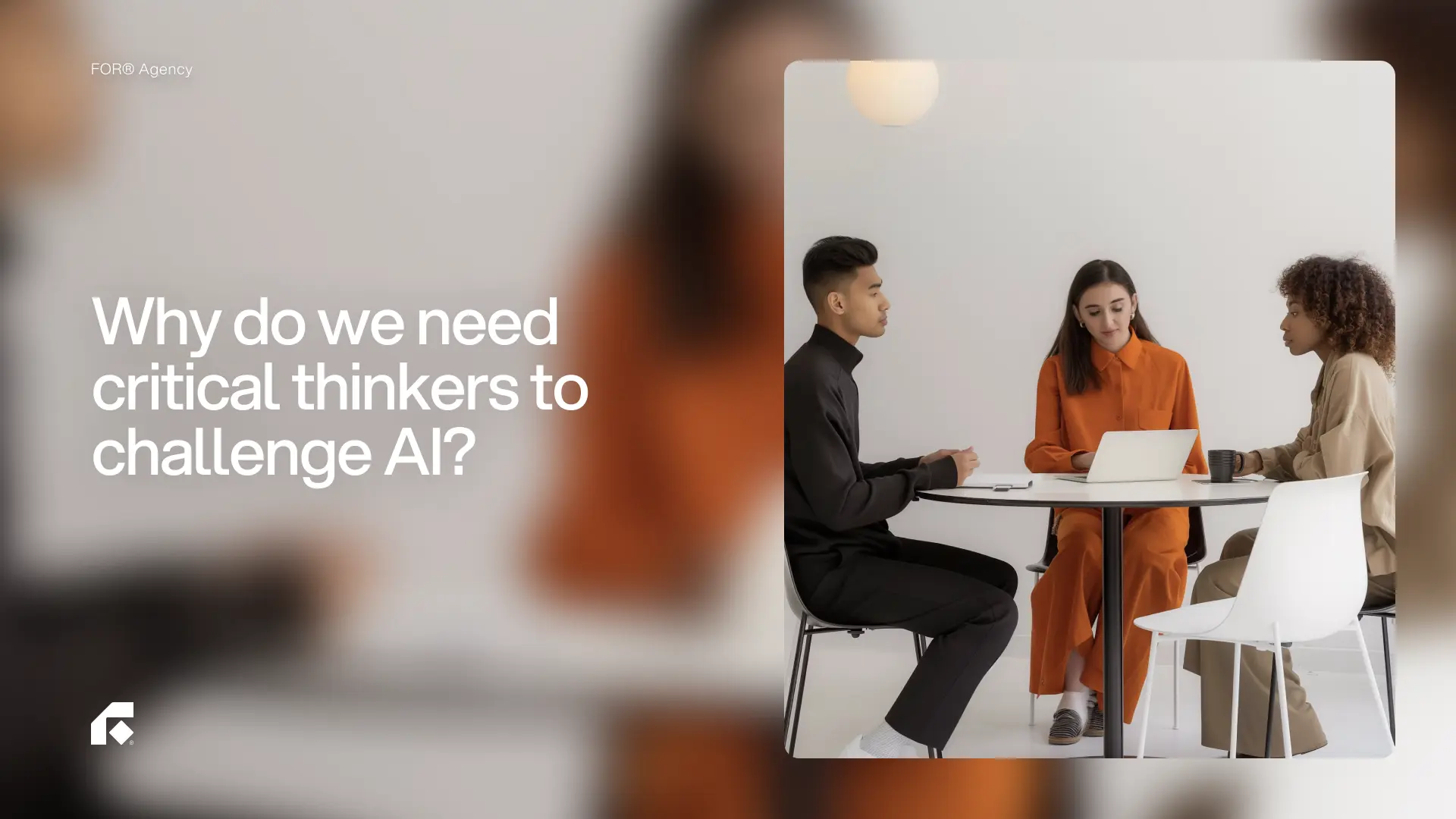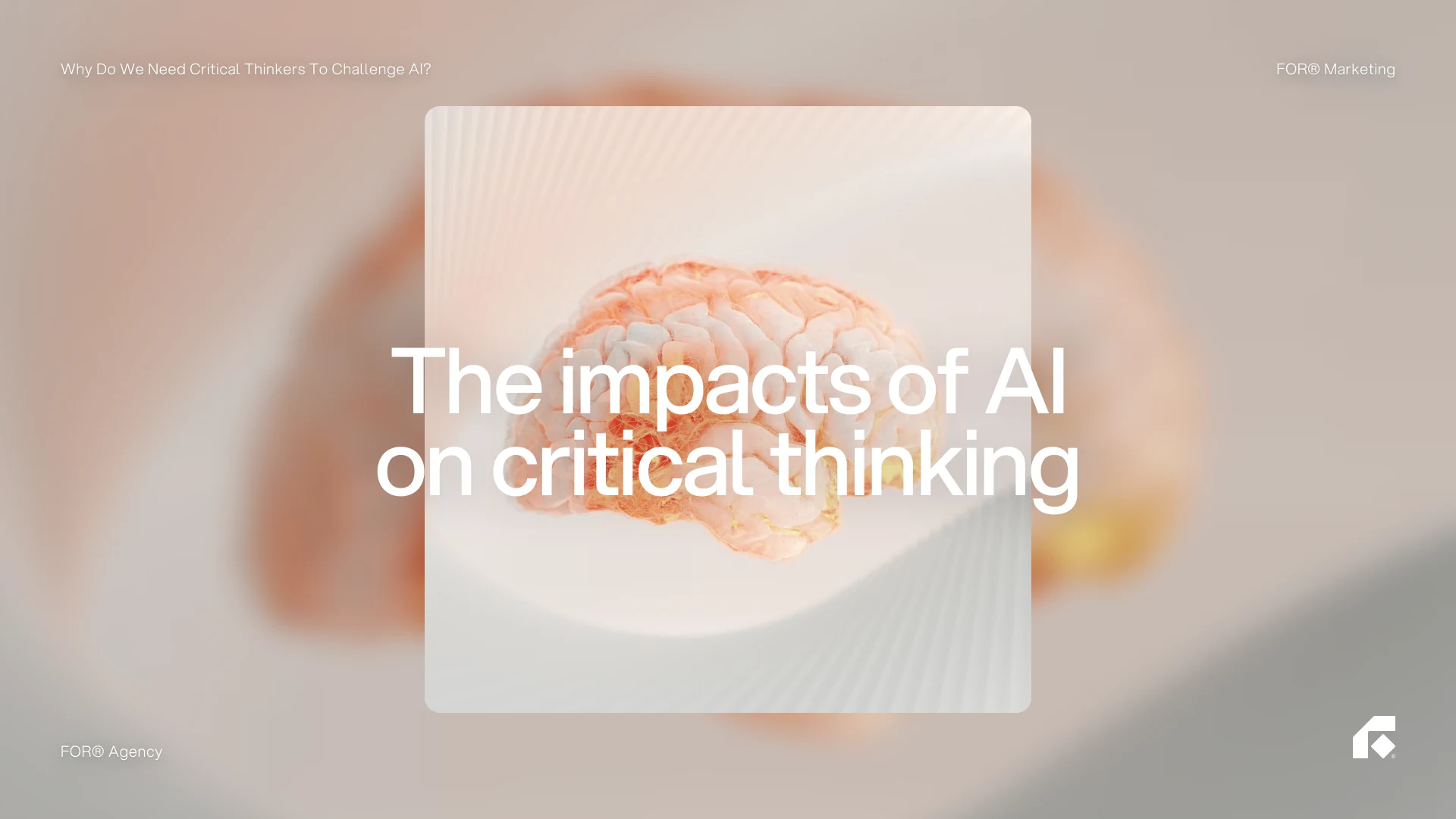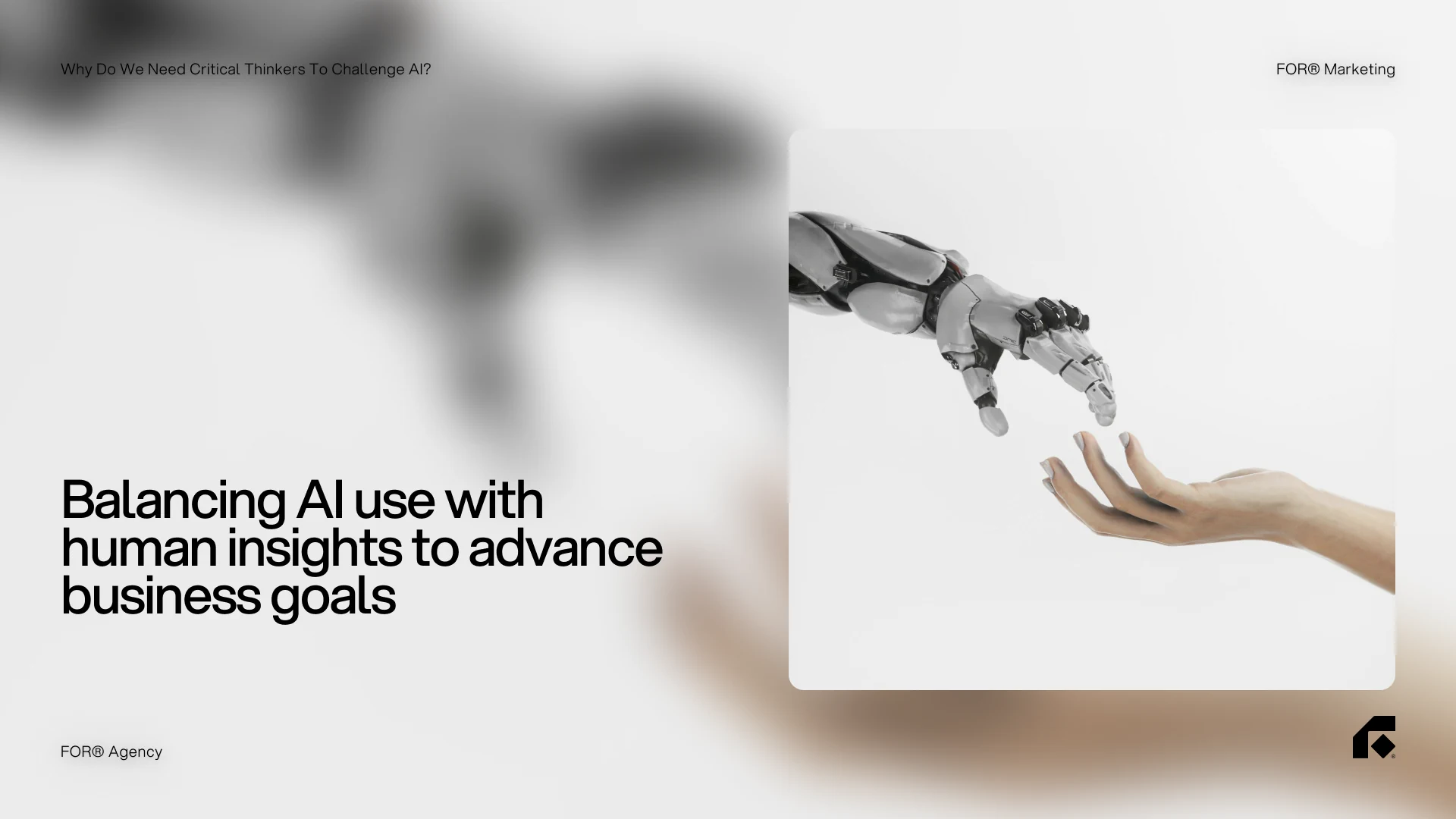Book a Call
Critical Thinking
AI Challenge
Human Intelligence
Human Centric AI
AI Impact
ARTICLE #69
Why do we need critical thinkers to challenge AI?



Critical Thinking
AI Challenge
Human Intelligence
Human Centric AI
AI Impact
Written by:
3 min read
Updated on: August 1, 2024
Toni Hukkanen
Head of Design

Creative Direction, Brand Direction
Toni Hukkanen
Head of Design

Creative Direction, Brand Direction
Toni Hukkanen
Head of Design

Creative Direction, Brand Direction
Recently, there has been more emphasis on the need for critical thinkers who can challenge AI rather than solely relying on automated prompts like ChatGPT.
Experts have added, “We look for individuals adept at interpreting AI-generated data with critical insights.” Their statement highlights the importance of human creativity and analytical depth in handling the complexities of AI and using its potential in an effective way.
Recently, there has been more emphasis on the need for critical thinkers who can challenge AI rather than solely relying on automated prompts like ChatGPT.
Experts have added, “We look for individuals adept at interpreting AI-generated data with critical insights.” Their statement highlights the importance of human creativity and analytical depth in handling the complexities of AI and using its potential in an effective way.
Recently, there has been more emphasis on the need for critical thinkers who can challenge AI rather than solely relying on automated prompts like ChatGPT.
Experts have added, “We look for individuals adept at interpreting AI-generated data with critical insights.” Their statement highlights the importance of human creativity and analytical depth in handling the complexities of AI and using its potential in an effective way.
The impacts of AI on critical thinking
The impacts of AI on critical thinking
The impacts of AI on critical thinking
The widespread use of ChatGPT underscores the increasing importance of critical thinking. People who possess sharpened critical thinking skills will excel at handling problems that AI may struggle with and using AI to boost their own abilities. Their ability to discern credible information from misinformation will help them safeguard against manipulation and unethical practices within AI applications.

Though AI has made significant advances over the last few years, it is still prone to several limitations that we will discuss here.
AI solutions can exploit our cognitive limitations
According to research published in Nature, AI solutions can negatively influence our cognitive limitations, which leads to illusions of understanding, such as when we think we know more about the world than we actually do. Researchers warn that even scientists who are trained to evaluate information critically are tempted by AI-generated insights.
These illusions can prevent the scientific community from recognising the development of scientific monocultures. Some questions, methods, and viewpoints overshadow alternative approaches in such monocultures. This often leads to less innovative and more error-prone scientific results.
Impact of AI on Consulting Services
Some well-known consulting groups have reported their increased productivity with OpenAI’s GPT-4. Critics have argued that costly consulting services may become obsolete if consultants use free AI tools like ChatGPT. The core argument is that consultants can obtain information directly from AI despite their high salaries, reducing the need for expensive consulting firms.
These statements challenge the traditional role of consultants as exclusive service providers of insights and advice. AI democratises access to data-driven recommendations, questioning whether consultants can continue justifying their fees by providing value beyond what AI already offers.
No doubt, AI has the ability to deliver quick, data-driven insights that can reshape how businesses perceive and use consulting services. This shift may diminish the demand for traditional consulting models in favour of more automated, cost-effective solutions.
Impact of AI accessibility on job markets
Whether developers, business users, or consultants are hiring or seeking AI-intensive jobs, there's a valuable lesson for everyone involved. The accessibility to AI allows individuals with limited skills to appear competent, levelling the playing field. It emphasises the need for candidates who can offer valuable perspectives and critical thinking to interpret AI-generated information.
Even highly skilled scientists, subject matter experts and technologists can sometimes become overly dependent on AI for their work instead of relying on their own expertise.
Over-reliance on AI can lead to lost productivity
In addition to issues like AI bias, ethics and job displacement, the dangers of overreliance on AI for expertise are just starting to be understood. In business settings, this over-reliance can compromise productivity and trust.
Research shows that users might change their actions to align with AI suggestions, find it hard to evaluate the performance of AI and struggle to understand its impacts on their decisions.
Though AI is an important tool for customer engagement, it shouldn't be used as a substitute for human experience and critical thinking.
The widespread use of ChatGPT underscores the increasing importance of critical thinking. People who possess sharpened critical thinking skills will excel at handling problems that AI may struggle with and using AI to boost their own abilities. Their ability to discern credible information from misinformation will help them safeguard against manipulation and unethical practices within AI applications.

Though AI has made significant advances over the last few years, it is still prone to several limitations that we will discuss here.
AI solutions can exploit our cognitive limitations
According to research published in Nature, AI solutions can negatively influence our cognitive limitations, which leads to illusions of understanding, such as when we think we know more about the world than we actually do. Researchers warn that even scientists who are trained to evaluate information critically are tempted by AI-generated insights.
These illusions can prevent the scientific community from recognising the development of scientific monocultures. Some questions, methods, and viewpoints overshadow alternative approaches in such monocultures. This often leads to less innovative and more error-prone scientific results.
Impact of AI on Consulting Services
Some well-known consulting groups have reported their increased productivity with OpenAI’s GPT-4. Critics have argued that costly consulting services may become obsolete if consultants use free AI tools like ChatGPT. The core argument is that consultants can obtain information directly from AI despite their high salaries, reducing the need for expensive consulting firms.
These statements challenge the traditional role of consultants as exclusive service providers of insights and advice. AI democratises access to data-driven recommendations, questioning whether consultants can continue justifying their fees by providing value beyond what AI already offers.
No doubt, AI has the ability to deliver quick, data-driven insights that can reshape how businesses perceive and use consulting services. This shift may diminish the demand for traditional consulting models in favour of more automated, cost-effective solutions.
Impact of AI accessibility on job markets
Whether developers, business users, or consultants are hiring or seeking AI-intensive jobs, there's a valuable lesson for everyone involved. The accessibility to AI allows individuals with limited skills to appear competent, levelling the playing field. It emphasises the need for candidates who can offer valuable perspectives and critical thinking to interpret AI-generated information.
Even highly skilled scientists, subject matter experts and technologists can sometimes become overly dependent on AI for their work instead of relying on their own expertise.
Over-reliance on AI can lead to lost productivity
In addition to issues like AI bias, ethics and job displacement, the dangers of overreliance on AI for expertise are just starting to be understood. In business settings, this over-reliance can compromise productivity and trust.
Research shows that users might change their actions to align with AI suggestions, find it hard to evaluate the performance of AI and struggle to understand its impacts on their decisions.
Though AI is an important tool for customer engagement, it shouldn't be used as a substitute for human experience and critical thinking.
The widespread use of ChatGPT underscores the increasing importance of critical thinking. People who possess sharpened critical thinking skills will excel at handling problems that AI may struggle with and using AI to boost their own abilities. Their ability to discern credible information from misinformation will help them safeguard against manipulation and unethical practices within AI applications.

Though AI has made significant advances over the last few years, it is still prone to several limitations that we will discuss here.
AI solutions can exploit our cognitive limitations
According to research published in Nature, AI solutions can negatively influence our cognitive limitations, which leads to illusions of understanding, such as when we think we know more about the world than we actually do. Researchers warn that even scientists who are trained to evaluate information critically are tempted by AI-generated insights.
These illusions can prevent the scientific community from recognising the development of scientific monocultures. Some questions, methods, and viewpoints overshadow alternative approaches in such monocultures. This often leads to less innovative and more error-prone scientific results.
Impact of AI on Consulting Services
Some well-known consulting groups have reported their increased productivity with OpenAI’s GPT-4. Critics have argued that costly consulting services may become obsolete if consultants use free AI tools like ChatGPT. The core argument is that consultants can obtain information directly from AI despite their high salaries, reducing the need for expensive consulting firms.
These statements challenge the traditional role of consultants as exclusive service providers of insights and advice. AI democratises access to data-driven recommendations, questioning whether consultants can continue justifying their fees by providing value beyond what AI already offers.
No doubt, AI has the ability to deliver quick, data-driven insights that can reshape how businesses perceive and use consulting services. This shift may diminish the demand for traditional consulting models in favour of more automated, cost-effective solutions.
Impact of AI accessibility on job markets
Whether developers, business users, or consultants are hiring or seeking AI-intensive jobs, there's a valuable lesson for everyone involved. The accessibility to AI allows individuals with limited skills to appear competent, levelling the playing field. It emphasises the need for candidates who can offer valuable perspectives and critical thinking to interpret AI-generated information.
Even highly skilled scientists, subject matter experts and technologists can sometimes become overly dependent on AI for their work instead of relying on their own expertise.
Over-reliance on AI can lead to lost productivity
In addition to issues like AI bias, ethics and job displacement, the dangers of overreliance on AI for expertise are just starting to be understood. In business settings, this over-reliance can compromise productivity and trust.
Research shows that users might change their actions to align with AI suggestions, find it hard to evaluate the performance of AI and struggle to understand its impacts on their decisions.
Though AI is an important tool for customer engagement, it shouldn't be used as a substitute for human experience and critical thinking.
Balancing AI use with human insights to advance business goals
AI is a powerful tool for productivity, but excessive reliance on generative AI for code or content can weaken people's critical thinking skills. But you can keep a balance by combining AI with human intelligence.

It isn't enough to get great results from AI; we need people who can think critically and provide their own perspectives on AI recommendations. There is a need for candidates with the self-awareness to question AI outputs and the courage to discuss these concerns with others to ensure the involvement of the human element.
The use of Generative and Predictive AI
Many businesses are using generative and predictive AI. Predictive AI helps decision-makers understand which lawyers visit their site to allow for personalised services. Generative AI creates content with predictive AI algorithms to analyse data and guide future actions.
Addressing over-reliance on AI
With the excessive use of AI, people tend to rely too much on it while neglecting their own judgement and diligence. Some people become too lazy and send random prompts to get responses and use them without checking their reliability and authenticity.
It is important to remind employees that they are getting paid for their perspective, not just AI-generated responses. Their critical thinking is needed, not AI's output.
AI is a powerful tool for productivity, but excessive reliance on generative AI for code or content can weaken people's critical thinking skills. But you can keep a balance by combining AI with human intelligence.

It isn't enough to get great results from AI; we need people who can think critically and provide their own perspectives on AI recommendations. There is a need for candidates with the self-awareness to question AI outputs and the courage to discuss these concerns with others to ensure the involvement of the human element.
The use of Generative and Predictive AI
Many businesses are using generative and predictive AI. Predictive AI helps decision-makers understand which lawyers visit their site to allow for personalised services. Generative AI creates content with predictive AI algorithms to analyse data and guide future actions.
Addressing over-reliance on AI
With the excessive use of AI, people tend to rely too much on it while neglecting their own judgement and diligence. Some people become too lazy and send random prompts to get responses and use them without checking their reliability and authenticity.
It is important to remind employees that they are getting paid for their perspective, not just AI-generated responses. Their critical thinking is needed, not AI's output.
AI is a powerful tool for productivity, but excessive reliance on generative AI for code or content can weaken people's critical thinking skills. But you can keep a balance by combining AI with human intelligence.

It isn't enough to get great results from AI; we need people who can think critically and provide their own perspectives on AI recommendations. There is a need for candidates with the self-awareness to question AI outputs and the courage to discuss these concerns with others to ensure the involvement of the human element.
The use of Generative and Predictive AI
Many businesses are using generative and predictive AI. Predictive AI helps decision-makers understand which lawyers visit their site to allow for personalised services. Generative AI creates content with predictive AI algorithms to analyse data and guide future actions.
Addressing over-reliance on AI
With the excessive use of AI, people tend to rely too much on it while neglecting their own judgement and diligence. Some people become too lazy and send random prompts to get responses and use them without checking their reliability and authenticity.
It is important to remind employees that they are getting paid for their perspective, not just AI-generated responses. Their critical thinking is needed, not AI's output.
Final Thoughts
The time is to encourage all teams to use generative AI tools for mundane development tasks to free up more time for strategic work with the business. Coders are often seen spending more time on administrative code that doesn't contribute innovatively. Using AI, they can employ voice prompts to handle these tasks.
As routine coding tasks are reduced, business analysts can now engage more in software development activities. This blurring of roles highlights a shift where AI enables more cross-functional collaboration and allows professionals to focus on higher-value tasks that drive business growth.
The time is to encourage all teams to use generative AI tools for mundane development tasks to free up more time for strategic work with the business. Coders are often seen spending more time on administrative code that doesn't contribute innovatively. Using AI, they can employ voice prompts to handle these tasks.
As routine coding tasks are reduced, business analysts can now engage more in software development activities. This blurring of roles highlights a shift where AI enables more cross-functional collaboration and allows professionals to focus on higher-value tasks that drive business growth.
The time is to encourage all teams to use generative AI tools for mundane development tasks to free up more time for strategic work with the business. Coders are often seen spending more time on administrative code that doesn't contribute innovatively. Using AI, they can employ voice prompts to handle these tasks.
As routine coding tasks are reduced, business analysts can now engage more in software development activities. This blurring of roles highlights a shift where AI enables more cross-functional collaboration and allows professionals to focus on higher-value tasks that drive business growth.
ARTICLE #69
More news



